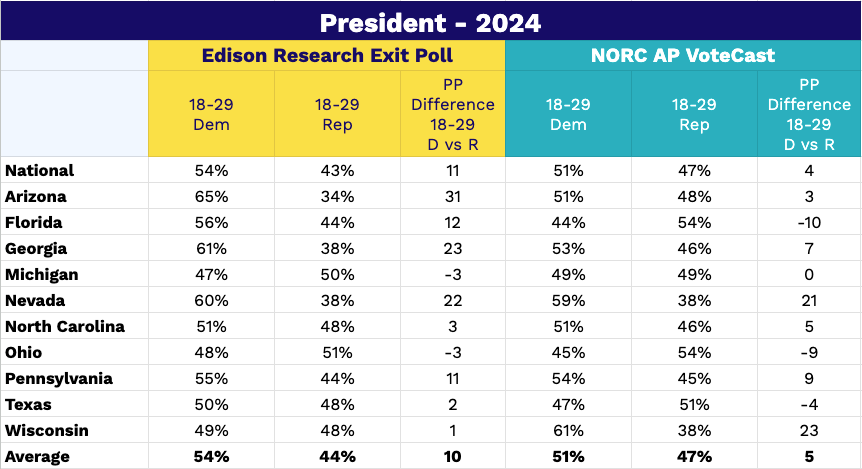The Youth Vote in 2024, Part II
The simple story you’ve been told is, well, not so simple.
No matter how many times I’m asked to comment on how youth voted in the 2024 election, my response is always the same: We don’t know. And there is good reason to believe that the headline many people have internalized–of a sharp “shift to the right”–is too simplistic. Polls and surveys are imperfect. Their results vary widely and there is no accepted standard for reconciling differing results.
When it comes to polling of young voters in particular, we shouldn’t assume samples are truly representative, given that young voters often register very late in the process, even up to Election Day in states allowing same-day registration. Campaigns and pollsters can’t reach voters unless and until they are registered and in the voter file. In addition, according to Axios, about half of young people say they have lied to someone close to them about who they are voting for, and it’s at least plausible to believe that these voters may not be scrupulously honest with pollsters, either.
We can all promise to take everything in the polls with a grain of salt. But still, we want to know, how did youth vote in 2024? I’m going to stick with the same answer: We don’t know.
To me the most important take-away is to avoid getting too caught up in minutia. Surveys and polls do not give a precise reflection of the past, and they don’t predict the future. They don’t address the capacity for change or how leadership, organizing, messaging, and campaign strategy can all impact outcomes down the line. They tell us nothing about the millions of youth who are not registered and who no one reached, and they don’t tell us anything about the 8 million more who are 16- and 17-years-old today and whose first opportunity to vote is coming soon.
**For more details on my analysis of youth polling and surveys in 2024, scroll down.
At a big picture level, what we hear from young people across the country is that they care about issues, and they are less focused on candidates and parties. This is not just anecdotal. Huge proportions of young people are registering to vote without a party affiliation today, a phenomenon that has been growing for years.
That doesn’t mean they don’t care. They care about key issues that directly impact their lives, like abortion rights, climate change, gun safety, housing and college affordability, quality education, fairness and equality, and mental health.
Democracy is a conversation, and it lasts a lifetime. Our role at The Civics Center is to make voter registration part of every high school in America, so that young Americans (aka, the 4 million who turn 18 every year and become eligible voters) are welcomed into our democracy and empowered to use their voices. When we look at the 2024 election results and polling, we see a mandate. But it’s not a mandate for one party or another. It’s a mandate to listen to young people and to help them get engaged.
Anyone looking at polls and surveys and concluding that young people will not make a difference in the years ahead is missing the big picture: young people and new voters present an opportunity for the future, but only if we do the work of listening and getting them registered.
**2024 Youth Voting Preferences:
A comparison of results from leading survey firms
In November I wrote about the differing results reported by different agencies about youth voting in the presidential race in 2024. The news at the time was full of reports about a purported dramatic “shift to the right” among young voters. The reports were based primarily on survey data compiled by NORC, a research organization at the University of Chicago. A competing report – an exit poll by Edison Research – also showed less support for Harris in 2024 compared to Biden in 2020, but to a much lesser degree than NORC.
Of course, there is a lot more to the “youth vote” than voting for president. To the extent we give credit to election polls and surveys at all, let’s at least consider the full range of elections they cover.
The survey results from Senate races and propositions on protecting abortion rights, if accurate, show the following:
Young voters favored Democratic candidates in US Senate races by far greater margins than they favored Harris over Trump; and
Young voters also favored abortion rights ballot measures by extremely wide margins.
Some of the details from these surveys deserve special comment:
Among competitive states, the Edison Research exit poll found that youth favored Democratic candidates in Senate races by an average of 15 percentage points, vs 10 points in these states for the presidential election.
That same poll found that youth favored abortion protection propositions by an average of 48 percentage points in Arizona, Nevada, and Florida. Florida’s proposition faced a 60% supermajority requirement to pass, and it did not achieve that result for the electorate as a whole, but if Edison’s survey is accurate, if only youth had voted, it would have passed by a large margin.
The Edison exit poll results came out with margins of youth support for Democratic candidates roughly twice as high on average as those reported by NORC AP VoteCast in both competitive Senate and presidential races.
Both agencies reported significant differences in candidate support based on party in different states, with Edison finding Arizona youth to be at the high end of supporting the Democratic candidate for both President and Senate and NORC finding Wisconsin in that role.
In some states and races, the data reported by NORC and Edison was similar (e.g., Michigan and Pennsylvania for both President and US Senate), while in others (e.g., Florida and Wisconsin), it was dramatically different.
These charts provide the details:
Sources:
NORC AP VoteCast (from FoxNews)
Edison Research (from the Washington Post)
For further insights we suggest the following:
Rachel Janfaza’s September 24, 2024 take on pre-election polling in The Up and Up
Jay Caspian King’s October 24, 2024 commentary in The New Yorker
John Della Volpe’s post-election analysis in conversation with Simon Rosenberg
For highlights of our past research and analysis, please see the following:
Who Is Responsible for Ensuring Universal Voter Registration?
Dear Democracy Funders: Let’s Lay the Groundwork for 2026 TODAY
Smoothing the On-ramp to Democracy: Voter Registration as a Staple of American High Schools




